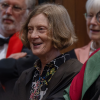
Judith Drinkwater
Director of Studies, Fellow, Tutor
Linguistics is a fairly new Tripos, having previously formed part of the Modern and Medieval Languages Tripos. Girton thus welcomes applicants for the Linguistics Tripos to join the small cohort already studying the subject with us.
Additionally Girton typically has 7 students in each year studying Modern and Medieval Languages and a large English community.
Linguistics students may be particularly interested in the annual Ridding Reading Prize, which involves reading a series of prose and poetry texts, both seen and unseen, to an appreciative audience, and in the Mountford Humanities and Arts Communications Prize.
Linguistics bridges the divide between arts and sciences. The main requirement for studying linguistics is a lively curiosity about the nature of language. It may be that you have been struck by a language that puts its verbs in a different position in the sentence, or wondered why languages change (making Chaucer hard to understand, for instance). You may have been puzzled that automatic speech recognition software gets a perfectly clear word wrong, or realised that an utterance such as ‘it’s cold in here’ may mean more than the words (understood: ‘do close the window!’). You may have been excited to learn that languages as diverse as Welsh and Hindi have a common ancestor. Basically, if you find yourself asking ‘why?’ or ‘how?’ in relation to language, linguistics may be for you. Because linguistics is interdisciplinary, specific A-level subjects are not required, and applicants who are science-oriented as well as those who are arts-centred are equally welcome. Some formal study of language, either through learning languages or through English Language A-level, does serve as a good preparation for the linguistics course. It is possible to start an undergraduate course in Modern & Medieval Languages and to change to Linguistics for the third and fourth years of the course.
Graduates from the Linguistics Tripos, and those studying languages (including English), have gone on to a range of careers in publishing, arts, the media, teaching and academia.